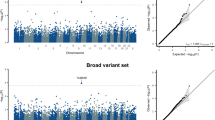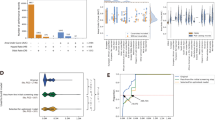Abstract
To identify bipolar disorder (BD) genetic susceptibility factors, we conducted two genome-wide association (GWA) studies: one involving a sample of individuals of European ancestry (EA; n=1001 cases; n=1033 controls), and one involving a sample of individuals of African ancestry (AA; n=345 cases; n=670 controls). For the EA sample, single-nucleotide polymorphisms (SNPs) with the strongest statistical evidence for association included rs5907577 in an intergenic region at Xq27.1 (P=1.6 × 10−6) and rs10193871 in NAP5 at 2q21.2 (P=9.8 × 10−6). For the AA sample, SNPs with the strongest statistical evidence for association included rs2111504 in DPY19L3 at 19q13.11 (P=1.5 × 10−6) and rs2769605 in NTRK2 at 9q21.33 (P=4.5 × 10−5). We also investigated whether we could provide support for three regions previously associated with BD, and we showed that the ANK3 region replicates in our sample, along with some support for C15Orf53; other evidence implicates BD candidate genes such as SLITRK2. We also tested the hypothesis that BD susceptibility variants exhibit genetic background-dependent effects. SNPs with the strongest statistical evidence for genetic background effects included rs11208285 in ROR1 at 1p31.3 (P=1.4 × 10−6), rs4657247 in RGS5 at 1q23.3 (P=4.1 × 10−6), and rs7078071 in BTBD16 at 10q26.13 (P=4.5 × 10−6). This study is the first to conduct GWA of BD in individuals of AA and suggests that genetic variations that contribute to BD may vary as a function of ancestry.
This is a preview of subscription content, access via your institution
Access options
Subscribe to this journal
Receive 12 print issues and online access
$259.00 per year
only $21.58 per issue
Buy this article
- Purchase on Springer Link
- Instant access to full article PDF
Prices may be subject to local taxes which are calculated during checkout


Similar content being viewed by others
References
Goodwin FK, Jamison KR, Akiskal H, Fawcett J, Ghaemi N, Hammen C et al. Manic-Depressive Illness, 2nd edn. University Press: Oxford, 2005.
Tsuang MG, Faraone SV . The Genetics of Mood Disorders. Johns Hopkins University Press: Baltimore, 1990.
Gershon ES, Hamovit J, Guroff JJ, Dibble E, Leckman JF, Sceery W et al. A family study of schizoaffective, bipolar I, bipolar II, unipolar, and normal control probands. Arch Gen Psychiatry 1982; 39: 1157–1167.
Rice J, Reich T, Andreasen NC, Endicott J, Van Eerdewegh M, Fishman R et al. The familial transmission of bipolar illness. Arch Gen Psychiatry 1987; 44: 441–447.
Spence MA, Flodman PL, Sadovnick AD, Bailey-Wilson JE, Ameli H, Remick RA . Bipolar disorder: evidence for a major locus. Am J Med Genet 1995; 60: 370–376.
Craddock N, Khodel V, Van Eerdewegh P, Reich T . Mathematical limits of multilocus models: the genetic transmission of bipolar disorder. Am J Hum Genet 1995; 57: 690–702.
Risch N, Botstein D . A manic depressive history. Nat Genet 1996; 12: 351–353.
Badner JA, Gershon ES . Meta-analysis of whole-genome linkage scans of bipolar disorder and schizophrenia. Mol Psychiatry 2002; 7: 405–411.
Segurado R, Detera-Wadleigh SD, Levinson DF, Lewis CM, Gill M, Nurnberger Jr JI et al. Genome scan meta-analysis of schizophrenia and bipolar disorder, part III: bipolar disorder. Am J Hum Genet 2003; 73: 49–62.
McQueen MB, Devlin B, Faraone SV, Nimgaonkar VL, Sklar P, Smoller JW et al. Combined analysis from eleven linkage studies of bipolar disorder provides strong evidence of susceptibility loci on chromosomes 6q and 8q. Am J Hum Genet 2005; 77: 582–595.
Nurnberger JI, Berrettini W, Niculescu AB . Genetics of psychiatric disorders. In: Fatemi SH, Clayton PJ (eds). The Medical Basis of Psychiatry. Humana Press: Totowa, NJ, 2008, pp 487–518.
Manolio TA, Brooks LD, Collins FS . A HapMap harvest of insights into the genetics of common disease. J Clin Invest 2008; 118: 1590–1605.
WTCCC. Genome-wide association study of 14,000 cases of seven common diseases and 3,000 shared controls. Nature 2007; 447: 661–678.
Altshuler D, Daly MJ, Lander ES . Genetic mapping in human disease. Science 2008; 322: 881–888.
Baum AE, Akula N, Cabanero M, Cardona I, Corona W, Klemens B et al. A genome-wide association study implicates diacylglycerol kinase eta (DGKH) and several other genes in the etiology of bipolar disorder. Mol Psychiatry 2008; 13: 197–207.
Sklar P, Smoller JW, Fan J, Ferreira MA, Perlis RH, Chambert K et al. Whole-genome association study of bipolar disorder. Mol Psychiatry 2008; 13: 558–569.
Ferreira MA, O'Donovan MC, Meng YA, Jones IR, Ruderfer DM, Jones L et al. Collaborative genome-wide association analysis supports a role for ANK3 and CACNA1C in bipolar disorder. Nat Genet 2008; 40: 1056–1058.
Purcell S, Neale B, Todd-Brown K, Thomas L, Ferreira MA, Bender D et al. PLINK: a tool set for whole-genome association and population-based linkage analyses. Am J Hum Genet 2007; 81: 559–575.
Sankararaman S, Sridhar S, Kimmel G, Halperin E . Estimating local ancestry in admixed populations. Am J Hum Genet 2008; 82: 290–303.
Pritchard JK, Stephens M, Donnelly P . Inference of population structure using multilocus genotype data. Genetics 2000; 155: 945–959.
Devlin B, Roeder K . Genomic control for association studies. Biometrics 1999; 55: 997–1004.
Freedman ML, Reich D, Penney KL, McDonald GJ, Mignault AA, Patterson N et al. Assessing the impact of population stratification on genetic association studies. Nat Genet 2004; 36: 388–393.
Abecasis GR, Cookson WO, Cardon LR . Pedigree tests of transmission disequilibrium. Eur J Hum Genet 2000; 8: 545–551.
Aruga J, Yokota N, Mikoshiba K . Human SLITRK family genes: genomic organization and expression profiling in normal brain and brain tumor tissue. Gene 2003; 315: 87–94.
Abelson JF, Kwan KY, O'Roak BJ, Baek DY, Stillman AA, Morgan TM et al. Sequence variants in SLITRK1 are associated with Tourette's syndrome. Science 2005; 310: 317–320.
Reichart LF . Neurotrophin-regulated signalling pathways. Philos Trans R Soc Lond 2006; 361: 1545–1564.
Schmidt HD, Duman RS . The role of neurotrophic factors in adult hippocampal neurogenesis, antidepressant treatments and animal models of depressive-like behavior. Behav Pharmacol 2007; 18: 391–418.
Neves-Pereira M, Mundo E, Muglia P, King N, Macciardi F, Kennedy JL . The brain-derived neurotrophic factor gene confers susceptibility to bipolar disorder: evidence from a family-based association study. Am J Hum Genet 2002; 71: 651–655.
Sklar P, Gabriel SB, McInnis MG, Bennett P, Lim YM, Tsan G et al. Family-based association study of 76 candidate genes in bipolar disorder: BDNF is a potential risk locus. Brain-derived neutrophic factor. Mol Psychiatry 2002; 7: 579–593.
Lohoff FW, Sander T, Ferraro TN, Dahl JP, Gallinat J, Berrettini WH . Confirmation of association between the Val66Met polymorphism in the brain-derived neurotrophic factor (BDNF) gene and bipolar I disorder. Am J Med Genet B Neuropsychiatr Genet 2005; 139B: 51–53.
Liu L, Foroud T, Xuei X, Berrettini W, Byerley W, Coryell W et al. Evidence of association between brain-derived neurotrophic factor gene and bipolar disorder. Psychiatr Genet 2008; 18: 267–274.
Maher B . Personal genomes: the case of the missing heritability. Nature 2008; 456: 18–21.
Acknowledgements
We thank the participants in the study, as without them this work would not have been possible. For best estimate diagnostic work, we thank Vegas Coleman, Robert Schweitzer, N Leela Rau and Kelly Rhoadarmer. For data management, we thank Mariano Erpe and for study coordination Carre Fisher RN. This work was supported by grants from the NIMH and NHGRI to JRK (MH078151, MH081804, MH059567 supplement), and by the Genetic Association Information Network (GAIN). This work was additionally supported by the NIMH Intramural Research Program (FJM and TGS). WHB was supported by a grant from the Tzedakah Foundation, a grant from NIH (R01 MH59553) and a grant from Philip and Marcia Cohen. Falk Lohoff was supported by the Daland Fellowship Award from the American Philosophical Society and by NIH grant K08 MH080372. David Craig and Corrie Panganiban acknowledge the Stardust foundation. Follow-up genotyping was performed in the laboratory of HE at Indiana University School of Medicine. This research was also supported, in part, by the Intramural Research Program of the NIH, National Library of Medicine. Dr Smith, Dr Bloss, Dr Murray and Dr Schork are supported in part by National Institutes of Health grant NIH 1U54RR025204-01. Data and biomaterials were collected in four projects that participated in the National Institute of Mental Health (NIMH) Bipolar Disorder Genetics Initiative. From 1991 to 1998, the principal investigators and coinvestigators were: Indiana University, Indianapolis, IN, U01 MH46282, John Nurnberger, Marvin Miller and Elizabeth Bowman; Washington University, St Louis, MO, U01 MH46280, Theodore Reich, Allison Goate and John Rice; Johns Hopkins University, Baltimore, MD U01 MH46274, J Raymond DePaulo, Jr, Sylvia Simpson and Colin Stine; NIMH Intramural Research Program, Clinical Neurogenetics Branch, Bethesda, MD, Elliot Gershon, Diane Kazuba and Elizabeth Maxwell. Data and biomaterials were collected as part of 10 projects that participated in the National Institute of Mental Health (NIMH) Bipolar Disorder Genetics Initiative. From 1999 to 2007, the principal investigators and coinvestigators were: Indiana University, Indianapolis, IN, R01 MH59545, John Nurnberger, Marvin J Miller, Elizabeth S Bowman, N Leela Rau, P Ryan Moe, Nalini Samavedy, Rif El-Mallakh (at University of Louisville), Husseini Manji (at Wayne State University), Debra A Glitz (at Wayne State University), Eric T Meyer, Carrie Smiley, Tatiana Foroud, Leah Flury, Danielle M Dick, Howard Edenberg; Washington University, St Louis, MO, R01 MH059534, John Rice, Theodore Reich, Allison Goate, Laura Bierut; Johns Hopkins University, Baltimore, MD, R01 MH59533, Melvin McInnis, J Raymond DePaulo, Jr, Dean F MacKinnon, Francis M Mondimore, James B Potash, Peter P Zandi, Dimitrios Avramopoulos and Jennifer Payne; University of Pennsylvania, PA, R01 MH59553, Wade Berrettini; University of California at Irvine, CA, R01 MH60068, William Byerley and Mark Vawter; University of Iowa, IA, R01 MH059548, William Coryell and Raymond Crowe; University of Chicago, IL, R01 MH59535, Elliot Gershon, Judith Badner, Francis McMahon, Chunyu Liu, Alan Sanders, Maria Caserta, Steven Dinwiddie, Tu Nguyen, Donna Harakal; University of California at San Diego, CA, R01 MH59567, John Kelsoe, Rebecca McKinney; Rush University, IL, R01 MH059556, William Scheftner, Howard M Kravitz, Diana Marta, Annette Vaughn-Brown and Laurie Bederow; NIMH Intramural Research Program, Bethesda, MD, 1Z01MH002810-01, Francis J McMahon, Layla Kassem, Sevilla Detera-Wadleigh, Lisa Austin, Dennis L Murphy.
Author information
Authors and Affiliations
Corresponding author
Additional information
Supplementary Information accompanies the paper on the Molecular Psychiatry website (http://www.nature.com/mp)
Rights and permissions
About this article
Cite this article
Smith, E., Bloss, C., Badner, J. et al. Genome-wide association study of bipolar disorder in European American and African American individuals. Mol Psychiatry 14, 755–763 (2009). https://doi.org/10.1038/mp.2009.43
Received:
Revised:
Accepted:
Published:
Issue Date:
DOI: https://doi.org/10.1038/mp.2009.43
Keywords
This article is cited by
-
Racial differences in the major clinical symptom domains of bipolar disorder
International Journal of Bipolar Disorders (2023)
-
Genotype-expression interactions for BDNF across human brain regions
BMC Genomics (2021)
-
Transcriptome analysis of neural progenitor cells derived from Lowe syndrome induced pluripotent stem cells: identification of candidate genes for the neurodevelopmental and eye manifestations
Journal of Neurodevelopmental Disorders (2020)
-
The genetics of bipolar disorder
Molecular Psychiatry (2020)
-
Dissecting clinical heterogeneity of bipolar disorder using multiple polygenic risk scores
Translational Psychiatry (2020)



